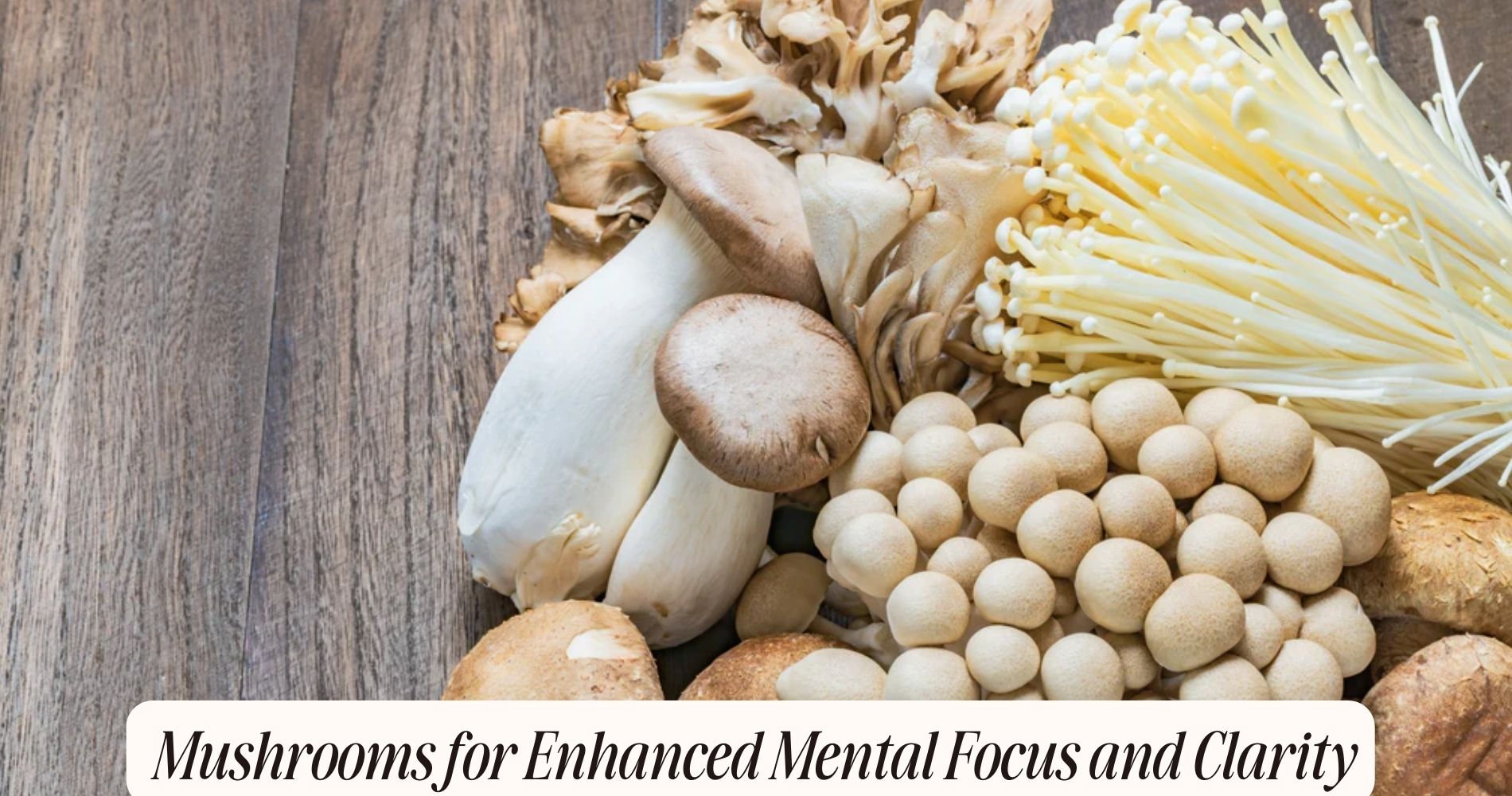
Does Lion's Mane Really Make You Smarter? Unpacking the Facts
What Is Lion's Mane?
Lion's Mane, scientifically known as Hericium erinaceus, is a type of medicinal mushroom renowned for its potential cognitive benefits and neuroprotective properties. You'll recognize it by its unique appearance, which resembles a cascading waterfall of white, spiny tendrils. This mushroom not only stands out visually but also has a place in the culinary world due to its versatile uses.
When you incorporate Lion's Mane into your diet, you're not just adding an interesting texture and flavor to your dishes. Studies have shown that this mushroom contains bioactive compounds like hericenones and erinacines, which may stimulate nerve growth factor (NGF) production. This could lead to improved cognitive function and overall brain health. Its culinary uses are diverse—you can sauté, grill, or even use it as a meat substitute due to its hearty texture.
In addition to its fascinating structure and potential health benefits, Lion's Mane's culinary applications make it a popular choice among chefs and health enthusiasts alike. By including it in your meals, you mightn't only enjoy a unique taste but also potentially support your cognitive health, according to emerging research.
Historical Uses
Throughout history, Hericium erinaceus has been utilized in traditional medicine for its purported cognitive and healing properties, particularly in East Asian cultures. You'll find that ancient remedies in China and Japan have long incorporated this unique fungus, commonly known as Lion's Mane, to treat various ailments. Historical records suggest that Lion's Mane was prized for its potential to enhance mental clarity and memory, indicating its early recognition as a cognitive booster.
In traditional Chinese medicine (TCM), practitioners used Hericium erinaceus to support digestive health, reduce inflammation, and improve general well-being. They believed that the mushroom's bioactive compounds could invigorate the mind and body.
Similarly, in Japanese culture, it was often brewed into teas and tonics to promote neurological health and longevity.
Evidence from these ancient remedies highlights a consistent theme: the belief in Lion's Mane's ability to support brain function and overall health. While modern science is just beginning to explore these claims rigorously, historical uses provide a foundational understanding of why this mushroom is now being scrutinized for its potential cognitive benefits.
Chemical Composition
You'll find that Lion's Mane contains unique active compounds like hericenones and erinacines, which may hold neuroprotective properties.
Studies have shown these compounds can stimulate nerve growth factor (NGF) production, essential for maintaining healthy neurons.
Active Compounds in Lion's Mane
Investigating the chemical composition of Lion's Mane reveals several active compounds, such as hericenones and erinacines, which are believed to contribute to its neuroprotective and cognitive-enhancing effects. To understand these compounds, you should examine the various extraction methods used in their isolation. Common approaches include hot water extraction, ethanol extraction, and dual extraction techniques. These methods are essential in obtaining high-purity hericenones and erinacines, ensuring the bioactive properties are preserved.
Lion's Mane mushrooms are globally distributed, found in North America, Europe, and Asia, each region presenting slightly different chemical profiles due to environmental factors. This global distribution necessitates standardized extraction methods to maintain consistency in the active compounds across different sources.
Hericenones, primarily found in the fruiting bodies, and erinacines, located in the mycelium, are of particular interest. These compounds have been shown to stimulate nerve growth factor (NGF) synthesis, which is vital for the maintenance and survival of certain neurons. Studies indicate that these compounds can cross the blood-brain barrier, enhancing their potential efficacy in cognitive function.
Neuroprotective Properties Explored
Given the neuroprotective potential of Lion's Mane, it's imperative to explore the specific chemical mechanisms through which hericenones and erinacines exert their effects. These compounds are known to stimulate the synthesis of nerve growth factor (NGF), a vital protein for maintaining brain health. NGF facilitates the growth, maintenance, and survival of neurons, which play a pivotal role in neurodegenerative prevention.
Hericenones, primarily found in the fruiting body, and erinacines, located in the mycelium, have different yet complementary roles. Hericenones have been shown to cross the blood-brain barrier, directly influencing brain function by promoting NGF synthesis. Erinacines, on the other hand, exhibit potent anti-inflammatory properties, which help reduce oxidative stress and prevent neuronal damage.
Studies indicate that these compounds can mitigate the progression of neurodegenerative diseases like Alzheimer's and Parkinson's by enhancing neuronal regeneration and reducing amyloid-beta plaques. By fostering a neuroprotective environment, they contribute to long-term brain health.
However, it's important to note that while preliminary research is promising, more extensive clinical trials are necessary to fully understand the efficacy and safety of these compounds in humans. Thus, the neuroprotective properties of Lion's Mane offer a compelling area for further scientific exploration.
Potential Cognitive Benefits
Lion's Mane mushroom contains bioactive compounds like hericenones and erinacines that are believed to enhance cognitive function by promoting neurogenesis and synaptic plasticity. These compounds are thought to stimulate the production of Nerve Growth Factor (NGF), a protein vital for the maintenance, survival, and regeneration of neurons. By enhancing NGF synthesis, these bioactive molecules potentially contribute to memory enhancement and cognitive longevity.
Studies have shown that hericenones and erinacines can cross the blood-brain barrier, making them effective candidates for influencing brain function directly. Research on animal models indicates that these compounds may improve spatial memory and recognition memory, suggesting that Lion's Mane could be beneficial for cognitive performance. While these findings are promising, more human clinical trials are needed to confirm these effects conclusively.
In addition to their role in neurogenesis, hericenones and erinacines are also believed to enhance synaptic plasticity, the brain's ability to adapt and reorganize synaptic connections. This property is crucial for learning and memory formation. Incorporating Lion's Mane into your diet could potentially support cognitive longevity, though it's important to approach these claims with cautious optimism pending further scientific validation.
Cognitive Benefits
Studies have shown that Lion's Mane mushroom may enhance cognitive function by promoting nerve growth factor (NGF) synthesis and improving synaptic plasticity. NGF plays an essential role in the growth, maintenance, and survival of neurons. By increasing NGF levels, Lion's Mane can potentially facilitate brain enhancement, thereby supporting more efficient neural communication.
When it comes to memory improvement, the mushroom's bioactive compounds, hericenones and erinacines, are particularly remarkable. These compounds can cross the blood-brain barrier and stimulate the production of NGF, which in turn might aid in the formation and retention of memories. Enhanced synaptic plasticity, which is the brain's ability to strengthen or weaken synapses in response to activity, is another mechanism through which Lion's Mane contributes to cognitive benefits. Improved synaptic plasticity can lead to better learning and memory consolidation.
Additionally, Lion's Mane may help mitigate cognitive decline associated with aging. By promoting neurogenesis and reducing inflammation, the mushroom could offer a protective effect against neurodegenerative conditions. While the exact mechanisms are still under investigation, the existing evidence suggests that incorporating Lion's Mane into your diet might be a valuable strategy for supporting cognitive health and enhancing brain function.
User Experiences
You might've heard various anecdotal reports claiming that Lion's Mane enhances cognitive abilities, often integrated into personal daily routines. Users frequently mention improvements in memory, focus, and mental clarity.
However, these experiences, while compelling, require careful examination to separate placebo effects from genuine cognitive benefits.
Anecdotal Cognitive Benefits
Many individuals report experiencing enhanced mental clarity and improved focus after incorporating Lion's Mane into their daily regimen. These subjective claims suggest that Lion's Mane may offer cognitive benefits, yet it's important to scrutinize these experiences analytically.
When people share their personal stories, the reported effects often lack the rigorous scientific validation required to substantiate such claims. Your experience with Lion's Mane could be influenced by placebo effects, where the expectation of improvement alone triggers perceived benefits. The human brain is remarkably suggestible, and believing you're consuming a cognitive enhancer can sometimes manifest in actual feelings of enhanced mental clarity.
Anecdotal evidence, while compelling, doesn't constitute scientific proof. Personal testimonials can provide valuable insights but are inherently biased and lack control variables. For more reliable data, you'd need double-blind, placebo-controlled studies that eliminate these biases. However, such studies on Lion's Mane are still limited.
Personal Daily Routines
Incorporating Lion's Mane into daily routines varies greatly among users, but common practices often include consuming it in supplement form or as a tea. For morning rituals, many users prefer taking Lion's Mane supplements with their first meal or blending it into their morning smoothies. This practice leverages the mushroom's potential to enhance cognitive function and provide a mental boost for the day's tasks. The active compounds in Lion's Mane, such as hericenones and erinacines, are believed to promote neurogenesis and support brain health.
On the other hand, evening habits involving Lion's Mane are less about immediate cognitive benefits and more about long-term brain health. Some users opt for a cup of Lion's Mane tea before bed, aiming to support the brain's natural repair processes during sleep. The polysaccharides in Lion's Mane may help reduce inflammation and oxidative stress, which are vital for maintaining cognitive function over time.
While individual experiences can vary, integrating Lion's Mane into your daily routine—whether through morning rituals or evening habits—might provide a multifaceted approach to cognitive health. However, consulting healthcare professionals to tailor the dosage and form that best suits your specific needs is crucial.
Potential Side Effects
Some users of Lion's Mane have reported experiencing mild side effects, including digestive discomfort and allergic reactions. These side effects are generally considered important and often occur when dosage guidelines aren't strictly followed. It's essential to start with a lower dose to assess your body's tolerance before gradually increasing it.
According to research, consuming more than the recommended amount can exacerbate these unwanted effects.
The long-term effects of Lion's Mane are still under investigation, but preliminary studies suggest that it's generally safe for extended use. However, due to the lack of extensive longitudinal studies, you should proceed with caution. Documenting any changes in your health over time can provide valuable insights and help you adjust your intake as necessary.
Allergic reactions, while uncommon, can be severe. If you experience symptoms like skin rashes, difficulty breathing, or swelling, discontinue use immediately and consult a healthcare professional.
Additionally, digestive issues such as bloating, nausea, and diarrhea have been reported, particularly when exceeding the suggested dosage.
How to Use
To effectively harness the cognitive benefits of Lion's Mane while minimizing side effects, it's important to understand the proper usage and recommended dosages. Studies suggest that a daily intake of 500-3,000 mg of Lion's Mane extract is generally effective. However, individual responses can vary, so starting at the lower end of the dosage spectrum and gradually increasing it may be advisable.
In terms of preparation methods, Lion's Mane can be consumed in several forms: capsules, powders, and teas are the most common. Capsules offer a convenient way to maintain consistent dosage recommendations, making them ideal for those with busy lifestyles.
Powders, on the other hand, provide flexibility and can be mixed into smoothies or meals, though precise measurement is important to avoid excessive intake.
Teas, which involve steeping dried Lion's Mane mushrooms, offer a more traditional approach and can be soothing, but the concentration of active compounds may be lower compared to extracts.
Always consult with a healthcare provider before starting any new supplement regimen, especially if you have pre-existing conditions or are taking other medications. This ensures that the use of Lion's Mane aligns with your specific health needs.
Boost Your Cognitive Health with Well Gummies
If you're curious about how lion's mane can enhance your cognitive abilities, you might want to try Well Gummies' 10-IN-1 MUSHROOM GUMMIES. These gummies are not only a convenient and enjoyable way to consume lion's mane but also include nine other functional mushrooms that support brain health and overall wellness. They offer a calm energy boost and sharper focus, perfect for maintaining a balanced body and clear mind throughout your busy day. Plus, they come in a delicious wild berry flavor, making them as tasty as your favorite candy. Enhance your cognitive journey today with Well Gummies, and experience the benefits of functional mushrooms in one easy step.
Frequently Asked Questions
Can Lion's Mane Be Combined With Other Nootropics?
Yes, you can combine lion's mane with other nootropics. Stacking benefits may include enhanced cognitive functions due to the synergy potential between compounds, as some studies show they work well together to improve mental clarity and focus.
Is Lion's Mane Safe for Children and Teenagers?
You should consult a healthcare professional before giving Lion's Mane to children or teenagers. While initial studies suggest low risk, precise dosage guidelines and potential developmental effects aren't fully established, necessitating expert advice for safety.
How Long Does It Take to Notice Cognitive Improvements?
You might notice cognitive improvements from Lion's Mane within a few weeks, but clinical trials show results can vary based on dosage variations. Typically, consistent intake for at least four weeks is recommended for measurable benefits.
Are There Any Dietary Restrictions When Taking Lion's Mane?
When taking lion's mane, you won't face any strict dietary restrictions. Make sure your daily dosage aligns with guidelines and consider interactions with other dietary supplements to maximize benefits and minimize potential side effects.
Does Lion's Mane Interact With Prescription Medications?
Yes, Lion's Mane can interact with prescription medications. It's important to monitor for side effects and follow dosage recommendations. Always consult your healthcare provider to guarantee safe integration into your regimen, avoiding adverse interactions.
Conclusion
After examining the evidence, you can see that lion's mane shows promise in enhancing cognitive function. The historical uses, combined with its unique chemical composition, indicate potential benefits.
Scientific studies provide preliminary support, though more robust research is needed. User experiences are generally positive, but it's important to be aware of potential side effects.
If you decide to try lion's mane, follow recommended guidelines to guarantee safe consumption and monitor your individual response.




